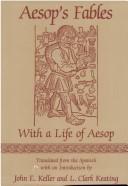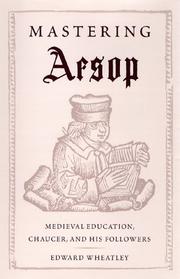| Listing 1 - 4 of 4 |
Sort by
|

ISBN: 0813158737 9780813158730 0813118123 9780813118123 0813185157 9780813185156 Year: 1993 Publisher: Lexington, Ky. University Press of Kentucky
Abstract | Keywords | Export | Availability | Bookmark
 Loading...
Loading...Choose an application
- Reference Manager
- EndNote
- RefWorks (Direct export to RefWorks)
In 1489 Johan Hurus printed the first collection of fables in Spain, Lavida del Ysopetconsusfabulas hystoriadas. Illustrated with nearly 200 woodcuts, this work quickly became the most-read book in Spain, beloved of both children and adults. Reprinted many times in the next three centuries and carried to the New World, it brought to Spanish letters a cornucopia of Aesopic fables, oriental apologues, and folktales that were borrowed by such writers as Cervantes, Lope de Vega, and especially the fabulists Iriarte and Samaniego. John Keller and Clark Keating now present the first English transla
Fables, Greek --- Fables, Spanish --- Spanish fables --- Translations into English.
Book
ISBN: 1283088827 9786613088826 1400836565 9781400836567 9781283088824 9780691144573 0691144575 9780691144580 0691144583 Year: 2011 Publisher: Princeton, N.J. Oxford
Abstract | Keywords | Export | Availability | Bookmark
 Loading...
Loading...Choose an application
- Reference Manager
- EndNote
- RefWorks (Direct export to RefWorks)
Examining the figure of Aesop and the traditions surrounding him, Aesopic Conversations offers a portrait of what Greek popular culture might have looked like in the ancient world. What has survived from the literary record of antiquity is almost entirely the product of an elite of birth, wealth, and education, limiting our access to a fuller range of voices from the ancient past. This book, however, explores the anonymous Life of Aesop and offers a different set of perspectives. Leslie Kurke argues that the traditions surrounding this strange text, when read with and against
Literature and society --- Literary form --- Popular culture and literature --- Popular culture --- Fables, Greek --- Greek prose literature --- Literature --- Literature and sociology --- Society and literature --- Sociology and literature --- Sociolinguistics --- Literature and popular culture --- Culture, Popular --- Mass culture --- Pop culture --- Popular arts --- Communication --- Intellectual life --- Mass society --- Recreation --- Culture --- History --- History and criticism. --- Social aspects --- Aesop --- Influence. --- Aesop's fables. --- Aisōpou mythoi --- Fables of Aesop --- Fabulae Aesopi --- Īcāp kataikaḷ --- Aesop in Mexico --- Μῦθοι (Aesop's fables) --- Mythoi (Aesop's fables) --- Corpus Fabularum Aesopicarum --- Ezop --- Esop --- Esopo --- Esope --- Aisōpos --- Esopus --- Ezovbos --- Ezopos --- Īcāp --- Isop --- אזוף --- אזופוס --- איסופוס --- עזאפ --- イソップ --- 伊索 --- Aesopi --- Äsop

ISBN: 0813024137 9780813024134 0813017459 Year: 2000 Publisher: Gainesville, Fla. : University Press of Florida,
Abstract | Keywords | Export | Availability | Bookmark
 Loading...
Loading...Choose an application
- Reference Manager
- EndNote
- RefWorks (Direct export to RefWorks)
"In this first study of a text from the primary school canon, Edward Wheatley examines fable as a mode of discourse in its medieval curricular context and then discusses the ways in which it influenced the work of Chaucer, Lydgate, and Henryson."--Jacket.
English literature --- Fables, Greek --- Fables, English --- Education, Medieval --- Animals in literature. --- Animals in literature --- English --- Languages & Literatures --- English Literature --- Education --- Medieval education --- Seven liberal arts --- Civilization, Medieval --- Learning and scholarship --- Greek fables --- British literature --- Inklings (Group of writers) --- Nonsense Club (Group of writers) --- Order of the Fancy (Group of writers) --- History and criticism. --- Adaptations --- Greek influences. --- History and criticism --- Greek influences --- History --- Chaucer, Geoffrey, --- Lydgate, John, --- Henryson, Robert, --- Aesop --- Aesopus --- Ezop --- Esop --- Esopo --- Esope --- Aisōpos --- Esopus --- Ezovbos --- Ezopos --- Īcāp --- Isop --- אזוף --- אזופוס --- איסופוס --- עזאפ --- イソップ --- 伊索 --- Lidgate, John --- Lydgate, John --- Lidgate, Iohn --- Monk of Bury --- Monke of Burie --- Monk of Bery --- Knowledge --- Literature. --- Appreciation --- Influence. --- Aesop's fables. --- Aisōpou mythoi --- Fables of Aesop --- Fabulae Aesopi --- Īcāp kataikaḷ --- Aesop in Mexico --- Μῦθοι (Aesop's fables) --- Mythoi (Aesop's fables) --- Corpus Fabularum Aesopicarum --- Aesopi --- Äsop
Book
ISBN: 9781612480008 9781612480688 1612480683 1612480004 9780271091303 0271091304 Year: 2011 Volume: 8 Publisher: Kirksville, Mo. Truman State University Press
Abstract | Keywords | Export | Availability | Bookmark
 Loading...
Loading...Choose an application
- Reference Manager
- EndNote
- RefWorks (Direct export to RefWorks)
Reformer of the church, biblical theologian, and German translator of the Bible Martin Luther had the highest respect for stories attributed to the ancient Greek author Aesop. He assigned them a status second only to the Bible and regarded them as wiser than ";the harmful opinions of all the philosophers."; Throughout his life, Luther told and retold Aesop’s fables and strongly supported their continued use in Lutheran schools. In this volume, Carl Springer builds on the textual foundation other scholars have laid and provides the first book in English to seriously consider Luther’s fascination with Aesop’s fables. He looks at which fables Luther knew, how he understood and used them, and why he valued them. Springer provides a variety of cultural contexts to help scholars and general readers gain a deeper understanding of Luther’s appreciation of Aesop.
Luther, Martin, --- Aesop --- Knowledge --- Fables, Greek. --- Appreciation --- Germany. --- Aesop's fables. --- Luther, Maarten --- Lutherus, Martinus --- Lutero, Martin --- Aesopus --- Ezop --- Esop --- Esopo --- Esope --- Aisōpos --- Esopus --- Ezovbos --- Ezopos --- Īcāp --- Isop --- אזוף --- אזופוס --- איסופוס --- עזאפ --- イソップ --- 伊索 --- Aisōpou mythoi --- Fables of Aesop --- Fabulae Aesopi --- Īcāp kataikaḷ --- Aesop in Mexico --- Luther, Martin --- Μῦθοι (Aesop's fables) --- Mythoi (Aesop's fables) --- Corpus Fabularum Aesopicarum --- Aesopi --- Äsop --- Luther, Martin, - 1483-1546 - Knowledge - Fables, Greek. --- Aesop - Appreciation - Germany. --- Influence (Literary, artistic, etc.) --- Art appreciation. --- SOCIAL SCIENCE --- Christian literature --- German literature --- Christian writings --- Christianity and literature --- Literature --- Religious literature --- Behavioral sciences --- Human sciences --- Sciences, Social --- Social science --- Social studies --- Civilization --- Greek fables --- Appreciation of art --- Art --- Reception of art --- Art criticism --- Artistic impact --- Artistic influence --- Impact (Literary, artistic, etc.) --- Literary impact --- Literary influence --- Literary tradition --- Tradition (Literature) --- Influence (Psychology) --- Intermediality --- Intertextuality --- Originality in literature --- Folklore & Mythology. --- Classical influences. --- Analysis, interpretation, appreciation --- Reception --- Aesop. --- Influence. --- Aesop's fables (Aesop) --- Fables (Aesop) --- Fabulae (Aesop) --- Īcāp kataika --- Alemania --- Ashkenaz --- BRD --- Bu̇gd Naĭramdakh German Uls --- Bundesrepublik Deutschland --- Deguo --- 德国 --- Deutsches Reich --- Deutschland --- Doitsu --- Doitsu Renpō Kyōwakoku --- Federal Republic of Germany --- Federalʹna Respublika Nimechchyny --- FRN --- Gėrman --- German Uls --- Герман Улс --- Germania --- Germanii︠a︡ --- Germanyah --- Gjermani --- Grossdeutsches Reich --- Jirmānīya --- KhBNGU --- Kholboony Bu̇gd Naĭramdakh German Uls --- Nimechchyna --- Repoblika Federalin'i Alemana --- República de Alemania --- República Federal de Alemania --- Republika Federal Alemmana --- Vācijā --- Veĭmarskai︠a︡ Respublika --- Weimar Republic --- Weimarer Republik --- ХБНГУ --- Германия --- جرمانيا --- ドイツ --- ドイツ連邦共和国 --- ドイツ レンポウ キョウワコク --- Germany (East) --- Germany (Territory under Allied occupation, 1945-1955) --- Germany (Territory under Allied occupation, 1945-1955 : British Zone) --- Germany (Territory under Allied occupation, 1945-1955 : French Zone) --- Germany (Territory under Allied occupation, 1945-1955 : Russian Zone) --- Germany (Territory under Allied occupation, 1945-1955 : U.S. Zone) --- Germany (West) --- Holy Roman Empire --- Cāstiriyār, Luttar, --- D. M. L. A., --- Joerg, Junker, --- Li︠u︡ter, Martin, --- Li︠u︡tėr, Martsin, --- Liuteris, Martynas, --- Lotera, Martin, --- Lu-toe, Ma-ti, --- Lusā, Mātaṅʻ, --- Luta, Martin, --- Lutawm, Matees, --- Lute̳e̳r, Martẽ, --- Luter, Marcin, --- Luter, Marṭin, --- Luter, Martinos, --- Lutero, Martín, --- Luters, Mārtiņš, --- Lūthar, Mārṭin, --- Luther, Maarten, --- Luther, Marczin, --- Luther, Martí, --- Luther, Martinus, --- Luther, Márton, --- Luther, Martti, --- Lūthœ̄, Mātin, --- Lutʻŏ, --- Lūtœ̄, Mātīn, --- Lutr, Martin, --- Luttar Cāstiriyār, --- Rutā, Marutin, --- Europe --- Лютер, Мартін, --- לוטהער, מארטין --- לוטהער, מארטין, --- לותר --- 路德马丁, --- ルター マルティン, --- Лютэр, Марцін, --- Лутер, Мартин, --- Luther, Martin, - 1483-1546
| Listing 1 - 4 of 4 |
Sort by
|

 Search
Search Feedback
Feedback About UniCat
About UniCat  Help
Help News
News